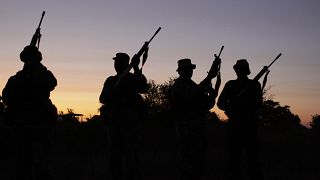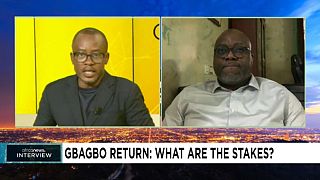Interview
Progress, development and peace are the fundamentals for a bright future for the African continent, Dr. Mo Ibrahim told Africanews.
"Democracy and rule of law are very important and we really need to pay a lot of attention to them. But this is not the whole story. People cannot eat democracy," he said.
"If we have democracy, but there's no food on the table or we have famine, what we're going to do with democracy."
Dr. Mo Ibrahim is a Sudanese-British billionaire who found fortune in telecommunications and later set up the Mo Ibrahim Foundation to encourage better governance in Africa. The foundation also created the Ibrahim Index of African Governance, to evaluate nations' performance.
He spoke to Africanews as the broadcaster celebrates its fifth anniversary and interviews leaders and cultural icons that are shaping the continent.
"We need to develop skills, we need more technical schools because that is education for employment," Ibrahim said.
"People can find work with it. It's important to listen to young people because the future belongs to them, not to us old men."
He also said: "We need peace in Africa because conflict destroys the government and our chances of moving forward."
You can watch the full interview in the video player above.
Ibrahim, every two years, your foundation publishes a global Index of governance in Africa. The last report, in 2020, was rather worrying. What is the situation looking like today?
Of course, we have the problem of the pandemic now, which is threatening not only the health of our people but also our economic situation. And for the first time in over 25 years, we started to see a recession in Africa while Africa was growing continuously over the last 25 years.
Of course, this is Covid and the outcome of it, which is not only limited to Africa, but everywhere, but it's hitting us hard because we don't have the fiscal space which as other countries have, which enabled them to borrow heavily to support the citizen and support the business.
There's no such support for our business in Africa or for our people. We ask them to stay home and they cannot earn any money, unfortunately. While in Europe and elsewhere, people sit at home and receive their paycheques.
To what extent has the African continent, in your opinion, improved or regressed over the past five years?
Well, actually, it's a mixed picture for Africa, unfortunately, over the last few years, we have seen deterioration in citizen rights, participation and democracy. That's really unfortunate. And that trend has been enforced during covid because some leaders also use restrictive measures around the health crisis to pass on more repressive laws. And we can see people banning political opponents from public gatherings while they are handing their own political rallies etc.
So it has been a clampdown really also because of covid, unfortunately, it has been misused in some cases. On the other hand, there are some bright spots. I mean, we see that there is development in the area of infrastructure and human development in general. It is still moving forward. But we are concerned about the rule of law and transparency and citizens' rights in general, which has been deteriorating.
Is governance limited to the respect of democracy, law and transparency?
Democracy and rule of law are very important and we really need to pay a lot of attention to them. But this is not the whole story. People cannot eat democracy. I mean, if we have democracy, but there's no food on the table or we have famine, what we're going to do with democracy.
We cannot eat democracy. It is important to create jobs, to improve education and health, economic development. People need to have clean water. People need to have access to power and energy. Governance is a basket, a basket of public goods.. and bad economy about human development, but also about rule of law and about democracy, and we need to see progress in all of this. There's no trade-off.
Several African countries are currently experiencing extremely complex situations: Chad, Somalia, Ethiopia to name a few. Some African leaders are clinging to power, conflicts are sprouting. There is also the impact of the pandemic, as well as the migration issue.
Faced with all these parameters, what do you think the future holds for Africa in the next 5 years?
Each crisis has a silver lining. It enables us to reset. We need to reset now and to think again about how we're going to move on from here. And that's important to review our path of development in the right path to have reasonable self-sufficiency without interruption to the trade routes. What that did to us, somebody who had problems, but we need it to really build back a more resilient economy.
And also, I hope for a more green economy. I wonder what big changes also have our young people. The majority of our population are young. We need to pay attention to our young people who don't know to lose more people in the Sahara or in the Mediterranean. We need to create jobs. We need to improve education. And that should be education for employment. We need to develop skills, we need more technical schools because that is education for employment. People can find work with it. It's important to listen to young people because the future belongs to them, not to us old men.
I mean, the problem in Africa, we have a lot of old men running the continent. And this is not really helpful. We need to move on from that and build a more progressive, more young, more active government, which is really focussing on the development of both, our human resources and our natural resources in hardbody. And we need peace. We need peace in Africa because conflict destroys the government and our chances of moving forward.
Africanews is celebrating its fifth anniversary. Is a pan-African channel that provides access to independent and reliable information giving voice to Africans now more crucial than ever for the continent?
Well, I want first to say happy birthday and congratulations. We need more and more independent media outlets because it's very important. Is this time and age when there are so many megaphones out there to have really reliable and decent platforms.
We need the truth, we need the facts, and we need hope.






![Rebuilding African economies post pandemic [Interview]](https://static.euronews.com/articles/stories/05/62/42/02/320x180_cmsv2_2042ec61-4bdf-570c-a7e2-cd7879fd6e70-5624202.jpg)






01:16
Africa mourns Pope Francis, a voice for peace and justice
00:47
Ghana: President Mahama suspends Chief Justice Gertrude Torkornoo
01:14
ECOWAS Meets in Ghana to Tackle Member Withdrawals
Go to video
Police rescue 33 West Africans from a human trafficking scam in Ivory Coast
Go to video
Pope Francis' funeral scheduled Saturday April 26
Go to video
Al-Qaida-linked militants attack a strategic town in Somalia